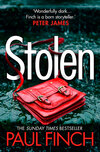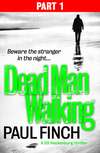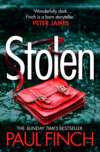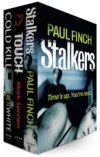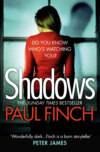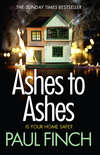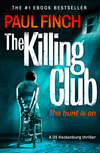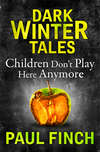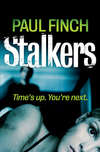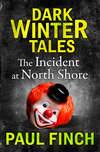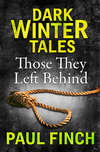Loe raamatut: «Stolen»
PRAISE FOR PAUL FINCH
‘Wonderfully dark and peppered with grim humour. Finch is a born storyteller and writes with the authentic voice of the ex-copper he is.’
PETER JAMES
‘Edge-of-the-seat reading … formidable – a British Alex Cross.’
SUN
‘An ingenious and original plot. Compulsive reading.’
RACHEL ABBOTT
‘As good as I expected from Paul Finch. Relentlessly action-packed, breathless in its finale, Paul expertly weaves a trail through the North’s dark underbelly.’
NEIL WHITE
‘A deliciously twisted and fiendish set of murders and a great pairing of detectives.’
STAV SHEREZ
‘Avon’s big star … part edge-of-the-seat, part hide-behind-the-sofa!’
THE BOOKSELLER
‘An explosive thriller that will leave you completely hooked.’
WE LOVE THIS BOOK

Copyright
Published by AVON
A Division of HarperCollinsPublishers Ltd
1 London Bridge Street
London SE1 9GF
First published in Great Britain by HarperCollinsPublishers 2019
Copyright © Paul Finch 2019
Cover design © Henry Steadman 2019
Cover photograph © Henry Steadman
Paul Finch asserts the moral right to be identified as the author of this work.
A catalogue copy of this book is available from the British Library.
This novel is entirely a work of fiction. The names, characters and incidents portrayed in it are the work of the author’s imagination. Any resemblance to actual persons, living or dead, events or localities is entirely coincidental.
All rights reserved under International and Pan-American Copyright Conventions. By payment of the required fees, you have been granted the non-exclusive, non-transferable right to access and read the text of this ebook on screen. No part of this text may be reproduced, transmitted, downloaded, decompiled, reverse engineered, or stored in or introduced into any information storage and retrieval system, in any form or by any means, whether electronic or mechanical, now known or hereinafter invented, without the express written permission of HarperCollins.
Source ISBN: 9780008244019
Ebook Edition © May 2019 ISBN: 9780008244026
Version: 2019-03-15
Dedication
For my wife, Catherine,
always my strong right arm.
Contents
Cover
Title Page
Copyright
Dedication
Prologue
Chapter 1
Chapter 2
Chapter 3
Chapter 4
Chapter 5
Chapter 6
Chapter 7
Chapter 8
Chapter 9
Chapter 10
Chapter 11
Chapter 12
Chapter 13
Chapter 14
Chapter 15
Chapter 16
Chapter 17
Chapter 18
Chapter 19
Chapter 20
Chapter 21
Chapter 22
Chapter 23
Chapter 24
Chapter 25
Chapter 26
Chapter 27
Chapter 28
Chapter 29
Chapter 30
Chapter 31
Chapter 32
Chapter 33
Chapter 34
Chapter 35
Chapter 36
Chapter 37
Chapter 38
Chapter 39
Chapter 40
Chapter 41
Chapter 42
Chapter 43
Chapter 44
Chapter 45
Chapter 46
Chapter 47
Keep Reading …
Praise for Paul Finch
About the Author
By the same Author
About the Publisher
Prologue
The Hollinbrook estate, in Crowley, was as suburban as they came.
Not rich, but the gardens were neat, tidy, their lawns smoothly mown if not expansive. The cars on the drives were mainly family affairs, some a little beaten-up, all implying middle-income rather than wealth. But if it wasn’t hugely prosperous, at least the Hollinbrook had the air of safety. It might be part of Greater Manchester’s sprawling conurbation, but Hollinbrook was peaceful and quiet, a sedate backwater, where children could play unsupervised, and where pensioners like Harry Hopkins could take their dogs out for a late evening stroll in full confidence that nothing bad would happen to them.
Not that this would normally have been an issue for Harry. A former collier, he’d been a burly bloke in his youth, and though seventy-seven now, he still had a bluff, rugged aura. In his day, ‘graft’ had been a word that meant something: hot sweat, aching muscles, hands cut and callused, a body shrouded black with coal-dust. And none of it a source of complaint – because that was your job, your life, that was what you did to put food on the table.
A quarter of a century had passed since Hollinbrook Pit had closed, but Harry wasn’t the sole relic of those arduous days. He still lived at No. 8, Atkinson Row, the only line of dwellings that hadn’t been bulldozed in the late 1990s, when they’d finally started developing the vast brownfield site. This was partly because Atkinson Row had never looked out of place in the proposed new townscape. Its houses were more than serviceable, a terraced row of traditional two-up-two-downs, but with solid roofs, secure foundations and no hint of subsidence. These days they were downright attractive, their brickwork repointed and whitewashed, new pipes and gutters fitted, each with its own little garden at the back instead of a tiny yard and outdoor privy. They were still referred to locally as the ‘Pit Cottages’, even though Harry was the only ex-pitman living there. He had lived alone for the last nine years, since Ada had passed, but his property was the smartest of the lot, with a box of flowers under the front window, and his front door painted canary-yellow.
It was just after ten o’clock when Harry closed this handsome door behind him, the lock catching. Milly, his small Pekingese, waited patiently. She was thirteen now, tubby, grey at the jowls and bandy-legged. But she was an affectionate little soul who liked nothing better than an idle wander with her master. Harry buttoned up his overcoat, tugged his trilby down at the front and drew on his fingerless gloves. It was September, and the searing heat of August had noticeably diminished. Nights were cool, and there was an edge to the breeze.
They set off up the road together, Milly snuffling at the base of every streetlight, lapping at the occasional puddle left over from the afternoon rain, despite Harry’s gruff admonitions. They turned right at the top of the road, following their usual route.
Though it wasn’t terribly late, it was midweek, so each street they came to was bare of life: Candlemaker Avenue, Rotherwood Drive, Hornby Crescent, Billington Grove. They even sounded suburban, and they certainly looked the part: more of those manicured front gardens, rockeries, shrubbery. It was a far cry from the narrow terraced streets of Harry’s day. But in general, he had to concede that things tended to change for the better. It was too easy to get dewy-eyed about the past, especially if you hadn’t been part of it.
Most windows were now curtained, only soft lamplight filtering through, though now and then he passed an open bedroom window, and heard music playing or what sounded like a TV programme. That was something that had not changed for the better, in Harry’s opinion: kids having all that kit in their bedrooms when they should be out, running around. Not that he would really have expected that at this late hour, of course.
And not when there was that other thing supposedly keeping them indoors.
The black van.
By instinct, Harry tightened his grip on the lead, drawing Milly closer. The old girl wasn’t too worried. She didn’t exactly scurry these days.
The black van, though …
Harry didn’t know if it was one of these so-called urban legends. But if it was, he’d only heard about it recently. It had been down at the bookies a couple of weeks ago.
‘Whenever you’re walking your Milly, Harry … keep your eye out for this black transit van. It’s touring the neighbourhoods late at night. I’m not sure what it’s supposed to be up to … but you can guarantee it’ll be no good.’
‘Well, if you don’t know what it’s up to, how do you know it’s no good?’ Harry had responded, puzzled.
A helpless shrug. ‘I dunno, pal. People are just saying it.’
‘Oh … must be true then.’
But now that he was out here on the road alone, and it was past ten o’clock, Harry didn’t feel quite so scathing. He was sure the black van thing was a myth. Good God, there were black vans all over. But though certain parts of Crowley, like this, had been prettified in recent years, he couldn’t deny that life wasn’t as tranquil overall as it once had seemed. Not even in the shopping district where you saw homeless folk everywhere. That was a sad story, but it was a nuisance too. Some of them had mental health problems, some of them were drug addicts, and nearly all of them were beggars. That had been almost unknown during his youth, even though everyone had been considerably poorer back then.
Equally unknown had been this new level of nasty criminality. Harry had always fancied himself a rough customer, but he wouldn’t go anywhere near the town centre pubs on a Friday or Saturday night, not these days. He much preferred The Horsehoe at the top end of the estate, even if it did have a reputation for being an old fellas’ pub. Harry didn’t mind. Anything was better than someone smashing a bottle over your head because you’d looked at them the wrong way, and then kicking your face as you lay on the floor. And it wasn’t just the town centre either. There were plenty of housing estates around Crowley that were just as bad; run-down neighbourhoods like Hatchwood Green for example. Nearly everyone in those miserable districts was unemployed, which didn’t help of course, though to Harry’s mind it didn’t excuse the wife-battering, the drunks sitting on doorsteps, the needles and condoms left in playground sandpits.
Harry knew all this went on because he knew men and women of his own age who were unfortunate enough to live in these areas, and they reported it every time he met them. But even the Hollinbrook wasn’t as safe as it might appear. Not these days. It had been idyllic once, but slowly and subtly things had been changing as the villains had started to notice it. There were burglaries here now and occasional vehicle thefts. Prowlers had been reported, even some pets had allegedly gone missing.
And then, as he pondered this, he heard the scuff of what sounded like boot leather.
He glanced up and caught someone stepping out of sight.
Just ahead of him, on the other side of the road.
Harry faltered in his stride.
He almost stopped – before pressing on, grumbling to himself.
Highly likely his imagination had been running wild thanks to those worrying reflections. But he was now approaching the crossroads between Billington Grove and Bucks Lane, and it really had looked as if someone had just scampered away around the left-hand corner.
Big deal, he told himself. Was it an offence to walk home?
But actually it hadn’t looked as if he’d just glimpsed someone walking home. It had looked as if they’d been standing watching him, and then had ducked away to avoid being seen. When he came level with Bucks Lane, he glanced left, not sure what he expected. Perhaps unsurprisingly, he saw nothing and no one – though that didn’t mean there was nobody there, as whoever it was could have gone to ground in any one of the front gardens.
‘Bloody hell, lad,’ he muttered. ‘You’re letting these daft stories get to you.’
He trudged on past the junction, and only after a hundred yards glanced back, to ensure that no one was behind him.
No one was. At least, no one who was close by. But was that dark, diminutive shape back at the crossroads a figure? Standing there motionless? Staring after him?
Harry squinted. Perhaps it was another dog-walker? That wouldn’t be unusual. Or some other innocent resident standing outside their house having a smoke? But if so, why did they seem so interested in him?
Unless they weren’t. Unless there was no one there at all.
Harry couldn’t be certain. Most likely, he was seeing things. Fading eyesight and substandard streetlighting were the probable explanation. But, determined to show that he wasn’t concerned either way, he ambled casually on, turning left down Tottington Road, Milly toddling at his side. Everything along here was as it should be: cars in driveways, front lawns scattered with children’s toys and occasional bits of garden furniture; typical end-of-summer scenery.
He looked back over his shoulder. The road was deserted.
Daft, he chided himself. If that had been some idiot waiting to jump him, he’d have done it back at the crossroads. Why would he be following?
Harry turned right onto Langtree Brow, and then right again into a ginnel. Here he halted, tall hedges on either side, as Milly squatted to do her business. After she was finished, he got a poop bag from his pocket, scooped it all up and tied the bag in a knot. More by instinct than design, he again glanced behind him. He was halfway along the ginnel, which ran for about seventy yards before crossing a narrow footbridge over the Manchester-to-Southport railway. The gap where it opened into Langtree Brow was empty, though why he’d thought it might not be eluded him.
He strode on, turning up his overcoat collar against the chill, depositing the poop bag in the next bin. Milly seemed happy, sniffing under the hedges, nothing troubling her.
They crossed the footbridge together, the railway cutting a strip of blackness beneath them. They were now at the furthest point from home, and Harry was ready to head back, his legs getting tired. Walking south along Rampton Road, he crossed the railway line again and then followed alongside it. The only sound was Milly’s gentle panting and the clicking of Harry’s leather soles on the damp pavement. Occasional gusts of wind whispered through the leafage in the gardens or moaned among the electric cables down in the cutting.
It was easy to feel alone at moments like this. And vulnerable.
He passed another couple of street-entrances on his right. The first led into Hopwood Lane, the second into Delamere Avenue. Again, no one was around, though, as it happened, halfway down Delamere a black van was parked up on the right.
Harry forced a chuckle, reminding himself that there was nothing unusual about that. He hadn’t seen the van before and he’d walked past here a dozen times this last month alone, but that meant nothing.
He turned left onto Rose Street, now well on his way home, though this was always the least comforting part of the journey, because though there were houses on the left, Hollister Park stood to the right. It was nothing really – a miniature green space provided by the estate’s original builders so the local kids would have somewhere to hang out. It had a playground, and lots of grass for football. Even so, it probably occupied no more than a handful of acres – though at this time of night it was an unlit void. There’d been some problems here during the summer, with teenagers gathering late on, drinking and shouting. But the police had been called, and that had been it.
Of course, that didn’t mean there wasn’t somebody there now, maybe just beyond the outer fringe of trees, keeping a silent, steady pace with Harry. Not that Harry knew what any would-be mugger would have to gain. It wasn’t like he carried money when he was walking the dog, or wore an expensive watch, or even had a mobile phone (despite his daughter Janet’s endless badgering that he acquire one). Again, he was vexed with himself for even thinking this way. This was his home neighbourhood, the place he’d lived all his life. He’d seen whole families come and go, he’d seen houses come and go, hell … he’d seen the pit come and go.
And he was frightened? Seriously?
Even so, he crossed to the other side of the road, so that the wet, leafy blackness of the park wasn’t directly at his shoulder. That wasn’t a sign that he was scared, he told himself; it was simple common sense. But he was still relieved to come to the end of the road and turn down Bradley Way. When a quick backward glance showed a clump of thickets on the edge of the park shuddering as though someone concealed among them was moving, Harry forced another chuckle.
‘Bloody breeze,’ he mumbled.
There was a breeze. He wasn’t making that up.
On Bradley Way, there was a minor incident when Harry glanced back and saw the headlights of a slow-moving vehicle only twenty yards to his rear.
He stumbled to a startled halt, at which point the vehicle, a large estate car, swung into the kerb to park. Harry continued to watch it even as he lurched on, until he blundered into a lamp-post. To the accompaniment of a faint, broken, rasping sound – what might have been muffled snickering laughter, though in truth was probably another breeze rattling the wet bushes – he hurried on, turning right into Malvern Avenue and then right again into Deerwood Close, where he stopped to get his breath and dab his forehead with a handkerchief.
It was okay, he told himself. He’d be home in a couple of minutes. He was almost there.
He glanced down at Milly, who’d craned her neck up to regard him curiously.
Even the bloody dog was wondering what was up with him.
Grim-faced, he crossed the road and turned onto Lodge Lane, and a few minutes later entered Atkinson Row at its bottom end. Harry could only feel relief as he wheezed his way along the pavement to his yellow front door. He inserted the key, looked to either side one last time – no one was anywhere in sight – and turned it. The door opened, and he stepped inside, Milly jumping over the step next to him. He wasn’t telling anyone down the bookies about this, that was for sure: how he’d become unaccountably afraid while walking the dog.
No … ‘afraid’ was the wrong word. He’d been nervous, that was all. A tad nervous. And why wouldn’t he be? Like it or not, he wasn’t a young bucko any more. And there were bad things going on. It might be a thought to take their evening stroll a little earlier from now on.
Harry closed the door, threw the bolt and applied the safety-chain. He unfastened the dog’s lead, and she trotted down the hall, turning into the living room, where the lights were still on and the television playing to itself.
Harry pulled his gloves off and took off his hat and coat, draping them over the newel post at the bottom of the banister. Milly meanwhile re-emerged from the living room and went through to the kitchen, which lay in darkness.
‘What’s up, lass … need a drink?’ Harry followed her in, switching the light on.
As always, the kitchen was impeccably clean, everything put away, the linoleum floor swept, the worktops sparkling. The mug Harry had left beside the kettle before he’d gone out still waited for him. It contained a teabag, one and a half spoonfuls of sugar and the spoon itself, and only required him to flip the kettle on, which he now did.
Then he noticed that Milly hadn’t touched her water-bowl. Instead, she stood with rigid spine, staring at the back door.
‘Something bothering you, lass?’ he asked.
He leaned over the sink and looked out through the kitchen window. He had a light in the back garden, but it was motion-sensitive, and at present was off. That was a positive thing, because it meant there was no one trespassing. But it also meant that he couldn’t see anything. Milly whimpered and pawed at the door.
‘Nothing out there, lass … what is it, a cat?’
It couldn’t have been that. If it had been, the light would have come on.
Harry leaned closer to the window, straining his eyes.
Gradually, the streetlighting seeping over the tops of the houses revealed the garden’s basic dimensions. It wasn’t large, about fifteen yards by ten, and mostly turfed, with the exception of a crazy-paved path running down the middle. To the right, where the coal-bunker had once stood, there was a brick-built dais – all Harry’s own work – with stone vases on top, containing plants. He could see that much. He could also see the potting shed standing to the left of his back gate, which, painted canary-yellow like the front door, was also clearly visible.
But now that he was looking hard, there was something else.
The top of a tall vehicle stood on the other side of his gate.
Harry felt a stab of confusion – that thing hadn’t been here when he’d left.
And then he got annoyed.
The Backs, as they called it, was a straight passage running along the rear of the terraced houses on Atkinson Row. It was little more than an access road; though narrow and unevenly cobbled, it was barely wide enough for vehicles, which meant that whoever had left this one here would be causing a massive obstruction – and right on the other side of the gate to No. 8. Harry wasn’t even sure if he’d be able to get out there. He had no clue who the vehicle might belong to, though he had a notion that the Rodwells, the young couple next door, were a bit rum. Okay, they weren’t lowlifes – they were teachers, apparently – but they’d had more than a few noisy barbecues in their garden during the summer months, which had gone on until late, and which they’d never offered apologies for. Even when they weren’t having barbecues, their friends tended to come and go loudly. A couple of times, he’d heard the Rodwells themselves squabbling through the dividing wall between his bedroom and theirs. So it wouldn’t be unlike them, or someone they knew, to have thoughtlessly left a vehicle in such an inconvenient place.
Grumpily, all previous concerns forgotten – because one thing you could never do was challenge Harry Hopkins in his own home – he unlocked the back door and stepped out. The garden light came on, and there was no mistake: a large, dark vehicle was parked just the other side of his back wall. He stumped along the path, Milly trotting inquisitively behind him, undid the bolts and yanked the gate open – to find a vehicle there so large that it literally filled the alley. Though its rear end was close to his gate, perhaps a yard to his left, there was minimal room to manoeuvre; less than a foot’s clearance separated its offside flank from his wall, which meant that he could only move along it if he slithered sideways.
But none of that mattered as much as the kind of vehicle it was.
A van.
A black transit van.
Fleeting pinpricks of sweat appeared on Harry’s brow; it was several seconds before he could even engage his voice.
‘Okay … okay,’ he grunted to himself.
This was a challenge, and no mistake – but there was no need to get jumpy. He’d already worked out what the problem was here: the Rodwells and their inconsiderate friends.
Thankfully, he hadn’t changed his shoes for slippers yet, so the fact there’d likely be lots of dirty puddles out there wasn’t a problem. He stepped from his gate and, as the rear of the van was nearest, edged in that direction first. For some reason, Milly hung back in the gateway. But Harry barely noticed, his temper continuing to fray as he thought more and more about the Rodwells and their loutish, snot-nosed pals. He noticed that the van wasn’t parked across their gate. When he reached the back of it, its rear doors were both closed, doubtless locked.
Moving to the vehicle’s nearside and finding that the passage on that side was wider by several inches, he sidled along it more quickly, though his feet sloshed through inches of mucky water. When he got to the front, there was nobody inside the cab. Both the front doors were also probably locked, but when Harry put his hand down to the radiator grille, warmth exuded from it. As he’d suspected, the damn thing had only recently arrived.
The more he looked at it now, the more he thought it was dark-blue rather than black, which was a relief in a silly kind of way. But that didn’t stop it being any less of a nuisance.
He was now well positioned to view the rear of the Rodwells’ house. There were no lights on at the back, but there could be at the front. Harry would need to go back through his house to check.
His slid along the vehicle’s nearside, circling its rear end towards his own gate – and there stopped in surprise. The left of the van’s two rear doors now stood open.
Harry was stumped.
Could it have been the wind? No, that was preposterous. There was the odd gust tonight, but nothing like sufficient to open a vehicle door, even if that door had been left ajar, which he was damn sure this one hadn’t.
So – had someone inside this van just climbed out?
He glanced over his shoulder, but the alley dwindled away in a straight line until it joined with the next street. There was no one there.
‘What the bloody hell?’ he muttered.
He leaned forward, poking his nose into the van’s interior. It was too dark to see anything, but now he wondered if that was a faint rustle of cloth he was hearing.
‘Is someone … someone in here …?’
Two hands in black leather gloves shot out of the darkness, gripping him by the cardigan collar.
He was yanked forward with tremendous force, smashing both kneecaps against the van’s rear bumper. The material of his trouser legs hooked on jagged metal, briefly anchoring him in place, allowing him to splay his arms out and grab at the door-frame on one side and the closed door on the other, wedging himself. As his shock ebbed, he began resisting, pushing backward, but those gloved hands were strong, and they dragged at him all the harder. Harry travelled forward again, feet leaving the ground, the material of his trousers ripping, along with the flesh underneath.
As he shouted in pain, one of the hands released his collar and slapped palm-first across his mouth. Then there was a thundering impact on the back of Harry’s head.
His world spun as his hands slipped loose and he slumped forward. Somewhere, there was a frantic yipping – was it Milly?
Whoever had hit Harry from behind now wrapped both arms around Harry’s thighs, and lifted him bodily, feeding him forward into the van’s interior. The person already in there continued to lug him.
The next thing Harry knew, though he was too groggy to make sense of it, he was lying in oily darkness, face-down on corrugated metal. As if that wasn’t enough, someone knelt on the middle of his back, pinning him with their full weight. And still that yipping went on, though it turned into a squeal of fright as a bundle of fur and paws was flung in alongside him. With an echoing CLANG!, the door slammed shut, and blackness descended.
The back of Harry’s head throbbed appallingly; hot fluid leaked through his thinning hair. Milly grizzled and snarled alongside him. When he attempted to speak – absurdly, it was to try and calm the dog – it came out a spittle-clotted burble. His captor responded by shifting one of his knife-like knees from the middle of Harry’s spine to the back of his head, pressing it down sideways, which intensified the raw, stinging pain. The old man yelped aloud, but it was lost as the vehicle rumbled to life and, with a shudder-inducing growl, accelerated away along the Backs.

